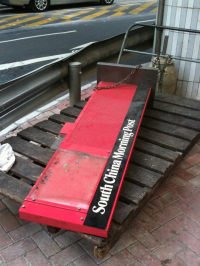Or: ‘Why, sometimes I’ve believed as many as six impossible things before breakfast’
This picture entitled Shackled and Abandoned, kindly sent to me from the corner of Tonnochy and Jaffe Roads in Wanchai, has raised a few laughs…
But then, also, a question: why does Hong Kong’s western population love to hate the South China Morning Post so much? Why do some normally sweet and tolerant folk curl at the lip and spit out the phrase ‘ScumPost!’ whenever anyone mentions the 107-year-old (this Saturday) daily?
Maybe it’s a piece of crap, and that’s the end of it. One routine, traditional complaint is that its international coverage is all pulled off wire services and cut and pasted from yesterday’s New York Times – as if a minority-language paper in Hong Kong (in 2010?) is going to maintain a chain of bureaus across the world. Obviously, the pages of overseas news in the middle are aimed at people who don’t keep up with foreign events on the internet or through international organs like the FT or IHT.
The SCMP’s only value – and only hope of offering value – to the expat audience is in conveying local and, in the editors’ dreams, Mainland information, reportage and analysis in English. Everything else is on-line. Japan, South Korea, Taiwan, Thailand and Indonesia have comparable publications, and the last time I checked they were worse than the SCMP: more insular, more propagandized, more amateurish. (They all lend themselves to mockery; don’t miss Bangkok’s brilliant Not The Nation*.) Anglophone Asia does no better. This doesn’t make the SCMP a leading journal of record, but imagine being trapped in an elevator for two hours with only a copy of the Manila Bulletin or Singapore’s kiddy-brainwashing Straits Times.
One reason the SCMP attracts resentment in certain Hong Kong circles is that (as with fellow gripe-magnets Cathay Pacific and HSBC) it dominates in its market and customers perceive little other choice. Alternative sources of English-language Hong Kong news are few. The Standard is translated from a lightweight Chinese-language counterpart that adores scandals and tycoons (giving it a curious English-market niche of its own). RTHK3 is good given that it broadcasts mostly radio-length snippets. Outside the realms of listings and business information, the SCMP has at least a semi-monopoly. With so little competition, the surprising thing is that it isn’t worse.
Like many Hong Kong media outlets these days, the SCMP is owned by a wealthy, pro-Beijing businessman. The theory is that these tycoons make the journalists censor themselves and in return, the Chinese government gives them commercial advantages or protects their interests. There is little visible evidence that it makes a difference. Plenty of Hong Kong’s elite have done OK in the Mainland without owning a bit of the Big Lychee’s press. Australian Rupert Murdoch found media holdings were more trouble than they were worth in developing ties with China. The tycoon who bought the SCMP from him, Robert Kuok, might agree; it must be a headache constantly wondering if one sentence among your newspaper’s hundreds of stories a week has offended a thin-skinned top official who certainly won’t mention it directly. And print media has been a lousy investment since the web came along.
A couple of well-respected writers on China have left the SCMP over the years, which isn’t a huge casualty rate (Willy Lam is still writing, after all – they didn’t salvage him). Editors seem to come and go every  couple of years. But how many readers who just want to keep tabs on what’s going on have noticed major swings in quality? Jingoistic headlines like yesterday’s about China reinventing the wheel with its own GPS system might seem jarring to those who took the paper’s pro-British stance for granted in the 1980s. But a dash of nationalism is not unusual in Hong Kong media in 2010; the majority of SCMP readers are Chinese; and it’s no more pandering than many western press reports about the Yuan and jobs. (And is it just me, or does the heavy-handed patriotic stuff tend to be mostly on the front page, where it will most effortlessly set nervous owners at ease?)
couple of years. But how many readers who just want to keep tabs on what’s going on have noticed major swings in quality? Jingoistic headlines like yesterday’s about China reinventing the wheel with its own GPS system might seem jarring to those who took the paper’s pro-British stance for granted in the 1980s. But a dash of nationalism is not unusual in Hong Kong media in 2010; the majority of SCMP readers are Chinese; and it’s no more pandering than many western press reports about the Yuan and jobs. (And is it just me, or does the heavy-handed patriotic stuff tend to be mostly on the front page, where it will most effortlessly set nervous owners at ease?)
What’s inside? The SCMP local news coverage is less sensational and less dreamed-up than average for Hong Kong’s lively press (hence the large Chinese-literate readership). It’s hardly their fault if nothing interesting happens…
The lengthy impermeability of the ‘National’ pages is, if nothing else, a useful daily reminder of what country we are in (for all of us, including the Hong Kong Chinese businessman who recently noted that he can name all 50 US states, but can’t recall most of China’s 30-whatever provinces). I don’t suppose anyone reads them enough to detect a pattern, but the editorials seem to be written to ensure a level of blandness fit for the most opinion-averse owner; it must be hard, unrewarding work, churning them out day after day. The letters page can be, to be charitable, an amusing freak show; the Harry and Ming cartoons occasionally seditious by many regional standards; the Op-Ed articles vary from interesting to stunningly vacuous (hardly surprising since, as I understand it, the SCMP doesn’t pay for most of them – it’s amazing anything fills the space at all). Zipping past the latest Enoch Yiu shoe-shining profile, we find business columns like Jake, Tom Holland and Shirley Yam that can make it into ‘provocative’ territory. The website is sealed off behind a paywall and clunky, as you would expect of a channel with a monopoly supply of material with small market demand. Now try the Hong Kong edition of China Daily.
So, SCMP: crap, perhaps, but not really bad crap under the circumstances.
*A bit more on the limitations of print media.



I love the way they put the Taiwan News in the National section…as though Taiwan was part of China or something…..
I refer to it as the Sycophantic Chinese Mouth Piece
anyone remember The Star ?
Pro China Morning Post or the Sub Standard – what a choice !
The best bit about the Post is the kids version that comes out on Sunday, in particular the game “spot the difference”. It’s a guaranteed 30-40 minutes of cranium creaking crackerjacktastic overload. Another favourite bit is the celebs page that appears on Friday. The number of beautiful people we have in our city makes me proud to be a Hong Konger. I am not too keen on that Steve Vines bloke – he’s a bit of a winge-bag.
Hemmers, you forgot the truly crap sunday edition supplement, complete with ink that adheres itself to any surface, emaciated fashion models selling over-priced tat, and some gweilo’s loft renovation or house in Sai Kung.
Mind you, I kind of enjoy examining the numerous comic like magazines that show some starlet buying fishballs in a 7 11 at midnight that chinese readers seem to enjoy.
“Dear Josh
there is this boy in my class that I really like. We used to be friends but
now he won’t even look at me anymore. I want to kill myself.
What do you think ? ”
D.P.
“Dear D.P, great idea !”
Josh
(from the Sunday kiddie section)
I spent 4 years living in HK and used to laugh at the SCMP too. I now live in Singapore, and look forward to my trips to HK for the chance to read a “proper” paper.
This story is right – SCMP may not be brilliant, but it’s nowhere near as bad as it could be, or as bad as the alternatives.
The same old scmp saw.. like discussing the weather, always guaranteed to bring out some vacuous opinions (including this one).
@Giles: Also moved to Singapore from HK and concur 100%.
I find little more annoying than the placidity and pleasure with which a Singaporean on a flight back home requests and immerses himself in a Straits Times.
Oh, and the SCMP letters page is a comedic joy to behold. I love it!
Dear Sir,
The standard of letter writing in your newspaper leaves much to be desired.
Most letters are written by locals with no grasp of creative prose.
They read as if they have been written by a bottom of the class sixth-grader.
They consist mainly of staccato one-sentence paragraphs.
Sometimes a second sentence will be added to a paragraph just to break the monotony.
But this does not happen very often.
This reflects very badly on Hong Kong.
But we should not blame the government.
Or the glorious Motherland.
Instead, we should work together harmoniously to put this right.
Yours faithfully,
Doctor Correspondent
(False) Name and Address Supplied
Has anyone noticed in the letters section, whenever a contributor complains about the treatment of helpers it gets one or two stars; but if some over-stuffed windbag employer whines about how tough their life is employing a helper it gets 5 stars. Staggering. I really think the people in this city new to grow the f#ck up, seriously.
Sir Crispin, there are a few ‘usual suspects’ that whine about any given topic. The hobby horses some have are quite funny to read, eg the guy with a beef with the ESF.
“international organs like the FT or IHT”
I know FT must mean Fortean Times, but what is IHT?
Maugrim,
I recall seeing some fundamentalist from Hamilton, Canada how spouts off about religion and Answers in Genesis. I wonder why the editor even bothers to print that kind of puff. It’s so far beyond the pale, it does a disservice to the SCMP to even consider it.
Oz,
International Herald Tribune, the foreign version of the New York Times.
Sir Crispin,
Wacko letters are published to get a rise out of people, generating more letters that joyfully skewer said wacko points of view.
Consider the correspondent (mental age 9) who recently wrote in to complain that the MTRC was breaching her human rights by prohibiting eating and drinking on trains.
It’s all good fun.
Doctor Correspondent,
Have you read the BBC News website recently ? It consists almost entirely of articles with one-paragraph sentences.
However, you are right that many of the correspondents are school students. A journalism lecturer let the cat out of the bag a few years ago when he stated in a radio programme that his colleagues (but not him, of course) gave good marks to submissions which had been printed in the SCMP – and had the most obvious mistakes corrected by the editor.
claw
I’ve resided in Hong Kong for 30 years watching a steady decline in the quality of the SCMP. There is no investigative journalism in Hong Kong – just a bunch of kids hanging around for press releases. Crime stories are a staple in most national newspapers and I know from my police mates that there is lots going on in Hong Kong that would make great copy. The problem appears to be that you need some rapport and understanding to develop between the cops and the reporters. Unfortunately, I’m told the hacks at the SCMP can’t be trusted not to embellish their stories. The cops have come not to trust them. Apparently its even worst with the Chinese newspapers.